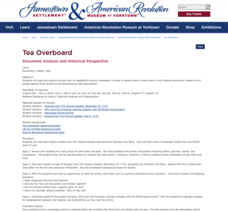National Endowment for the Humanities
Lesson 3: Religion and the Fight for American Independence
Pupils explore the role religion played in the American Revolutionary War. Using primary documents and writing exercises, students understand how religion was used in support of the war efforts and how specific religious groups responded...
Curated OER
Corridos About the Mexican Revolution
Students explore the meaning behind Mexican corridos. In this Mexican Revolution lesson, students discover details about the war and its leaders as they read, analyze, and write their own corridos.
Curated OER
Case Studies of American Innovation
Studnets discover how the Industrial Revolution came to be in the United States. In this technological advancements lesson, students research creations by Henry Ford, the Wright Brothers, and Thomas Edison. Students create PowerPoint...
Curated OER
Enemy or Ally: America's Response to the Russian Revolution
Students examine the events related to the Russian Revolution. In groups, they use the internet to discover the concerns of Woodrow Wilson during this time period and relate them to the origins of the Cold War. To end the lesson, they...
National Endowment for the Humanities
Revolution '67, Lesson 1: Protest: Why and How
To some people, protesting is as American as apple pie, but the factors that lead to protests can be as confusing to veteran activists as to today's youth. Revolution '67 explores the riots in Newark, New Jersey as a case study. Using...
Curated OER
The War in the South, 1778-1781
Young scholars explore the major terms of the Franco-American alliance and their importance to the cause of independence. The most important military engagements in the South are discussed and their significance for the outcome of the...
National Endowment for the Humanities
The War in the South, 1778–1781
The second in a three-part look at the Revolutionary War focuses the years from 1778 through 1781 and zooms in on military operations in the southern colonies, the French alliance, and the role African-Americans played in events. Class...
National First Ladies' Library
The First Great Awakening
Connecting social studies and American literature, students study the Great Awakening and draw comparisons between its impact on England and on parts of Colonial America. They research the lives and experiences of people who lived during...
Ford's Theatre
How Perspective Shapes Understanding of History
The Boston Massacre may be an iconic event in American history, but perhaps the British soldiers had another point of view. Using primary sources, including reports from Boston newspapers and secondary sources from the British...
Curated OER
What Makes a General?
Students explore the duties of commander-in-chief. In this George Washington lesson, students research Revolutionary War military leaders and examine the relationships they had with George Washington.
Jamestown-Yorktown Foundation
Tea Overboard
While less well known than the event in Boston, the Yorktown Tea Party was equally decisive in turning community sentiment against Great Britain. To gain an understanding of why the colonists objected to the Tea Act, young historians...
Curated OER
Abraham Lincoln on the American Union: " A Word Fitly Spoken"
Students consider Lincoln's perspective. In this presidential perspectives lesson, students explore the political thoughts of Lincoln through a series of lessons that make use of primary source analysis. They hypothesize and take a...
Curated OER
Patriots and Loyalists
Learners examine portraits by John Singleton Copley and discuss how the subject's appearance communicates important information about his or her life. They write a diary entry from the point of view of a portrait subject.
Pulitzer Center
China's Rising Labor Movement
Young historians will explore the complex causes and effects of industrialization in China by perusing the numerous articles included in this webpage. Throughout the resource, there are many writing and discussion prompts to help direct...
Curated OER
Meet the Press: American Presidents
Students interpret historical evidence presented in primary and secondary resources. In this presidential history lesson, students research the accomplishments of George Washington, Abraham Lincoln, Frankiln D. Roosevelt, and Barack...
Roy Rosenzweig Center for History and New Media
Patriots or Traitors - Point of View in the War for Independence
Patriots or traitors? Class members analyze images that present widely differing views of the Boston Tea Party, identifying the point of view of the image, the propaganda devices used, and the intended audience.
Jamestown-Yorktown Foundation
Why Did Some Colonial Virginians Seek Independence?
To understand the reasonings of those colonials who sought independence from England, young historians are divided into content groups that examine documents related to either the Boston Tea Party, the Yorktown Tea Party, Tea Overboard,...
Museum of the American Revolution
Object Observation: Purpose on a Powder Horn?
Young archeologists discover the significance of ordinary objects from the past in an interesting lesson on artifact analysis. The activity focuses on examining the image of a powder horn from the Revolutionary War to understand what it...
National Endowment for the Humanities
"An Expression of the American Mind": Understanding the Declaration of Independence
Learners research the structure of the Declaration: introduction, main political/philosophical ideas, grievances and assertion of sovereignty. They analyze the ideological/political origins of the ideas in the Declaration. Students...
Curated OER
On The Road Again: Cars, Culture, and Change Along Historic U.S. Highway 67
Middle and high schoolers look at historical photos and analyze some of the changes brought about by the automobile revolution in Arkansas during the 1920's. The book, A Journey Through Arkansas: Historic U.S. Highway 67, is used for...
Curated OER
Global Warming
A series of independent learning activities teaches learners about global warming as it relates to economics and industrialization. The culminating project requires them to create a multimedia presentation identifying the problems,...
Curated OER
Geography And The Revolutionary War
Students gain a deeper understanding of both geography and the Revolutionary War. They practice using on line research in examining historical events and using political, physical, and topographic maps.
Curated OER
Revolutionary Women of South Carolina
Students examine multiple primary sources. In this revolutionary war lesson, students read case studies regarding women from South Carolina. Students will compare the different roles women played during the Revolutionary War. Students...
Curated OER
Taking Up Arms and the Challenge of Slavery in the Revolutionary Era
Students examine a series of documents which discuss the contradiction in the Americans' rhetoric about slavery. They act as members of designated Committees of Correspondence in the five different colonies, communicating their...

























